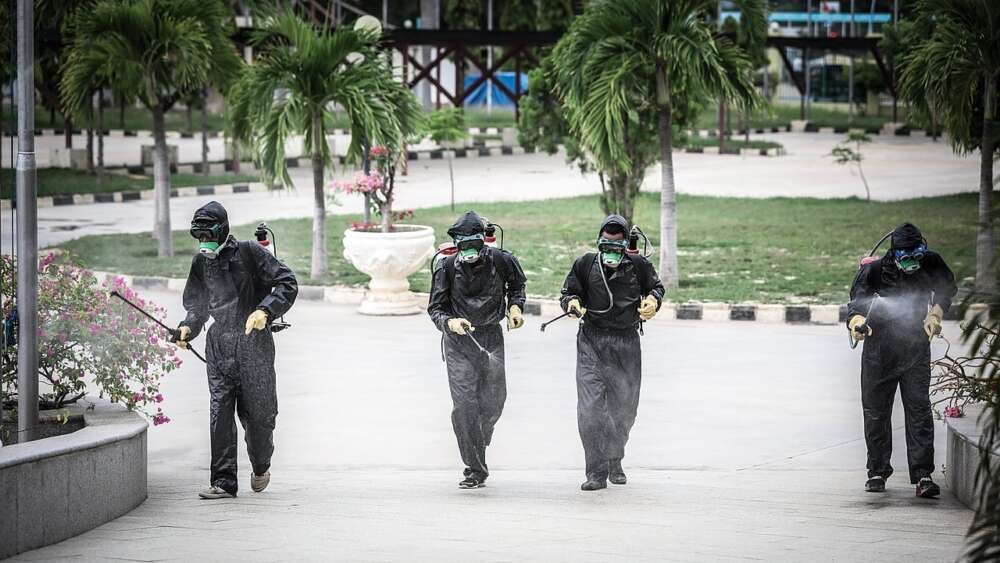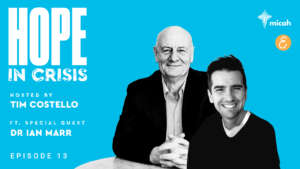The Aussie doctor fighting COVID in our poorest neighbouring country
“God led me into this position”
Ian Marr never wanted to be a doctor. But God had different ideas. And now, Marr – a boy from Orange, NSW – is a helping lead the charge against COVID-19 in the fledgling nation of Timor-Leste in South-East Asia.
This is no easy feat in a newly independent, poverty-stricken country that’s still recovering from years of civil war. And COVID has added massive pressure to its already struggling health system.
Marr – now a leading expert in infectious disease – had been working in Timor-Leste for six months before the pandemic hit. He was helping to build the capacity of laboratories to diagnose infectious diseases, and to create an infectious disease service within their national hospital.
“I feel very strongly that God’s led me on this path and into the position that I’m in right now.” – Ian Marr
According to Marr, infectious diseases account for up to 90 per cent of hospital patients in many low socio-economic countries like Timor-Leste and West Africa, where he worked previously.
“In a lot of these countries, people will present with a fever. It could be malaria or tuberculosis. But you know, it could be something else that you’d just be sitting there without the ability to say ‘this is what it is’,” says Marr, explaining the importance of developing diagnostics to host Tim Costello on the latest episode of Eternity‘s Hope in Crisis podcast.
Marr’s attraction to the medical profession began when he was diagnosed with cancer at age 18 and spent much of the following year in hospital. After attending medical school, he felt called to train as an infectious disease physician and microbiologist.
“I never wanted to be a doctor. Growing up in Orange, I had many different ideas about who I wanted to be and what I was going to become. But I feel very strongly that God’s led me on this path and into the position that I’m in right now. And I’d like to be able to use that to bring glory and honour to him,” he says.
When COVID-19 descended upon Timor-Leste, it proved to be far more than just another disease to diagnose and then arrange the logistical puzzle of quarantine and contact tracing. Firstly, Marr’s work was complicated by the fact that he and his family had to return to their home in Perth before Australia’s borders closed. However, from here, he’s continuing his work coordinating COVID-19 testing with laboratories in Timor-Leste.
“The hospital is paying upwards of eight to ten times the cost for regular medicines.” – Ian Marr
So far there have only been only around 30 cases of coronavirus recorded in Timor-Leste, due to the aggressive lockdown measures taken when COVID hit. This has bought time for Marr and his team to get COVID testing up and running. However, Timor-Leste has very meagre resources with which to fight this pandemic when compared to developed nations.
“[Good] health care access is something that in Australia we’re very blessed to have. In Victoria at the moment, it’s pulling out 30,000 COVID tests a day – it’s crazy. The sort of numbers that Australia’s able to pull off is quite astronomical. In the States, similarly, they’re [testing] such massive numbers,” says Marr.
“[In Timor-Leste] we’re at [a total of] 3500 tests out, but they don’t have the capability to be able to screen [everyone] and open up their borders entirely. And so, their only real asset is to be able to shut down, to lock borders, pull out the army to stop movement. That has big ramifications long term.”
These ramifications are already being felt. So while infection rates are low, coronavirus could result in economic devastation for Timor-Leste.
The country does not produce much of its own food and resources, and in its population of 1.2 million, 300,000 people are malnourished. The added impact of an aggressive COVID lockdown – requiring the closing of borders and trade with neighbouring nations, especially Indonesia – is already leading to what Marr describes as a “slow decline”.
“We’re seeing now that pharmacies in town are running very low on all sorts of stock. The hospital is paying upwards of eight to ten times the cost for regular medicines, so it’s a challenge to try and get access to the drugs they need …
“So you can see that whilst COVID isn’t such a problem right now, the outcome … is going to cause pain and disharmony.”
“These people understand truly what it is to have nothing but God by their side.” – Ian Marr
In spite of these seemingly dire outcomes, Marr is struck by the hope of people in Timor-Leste, and in other countries facing huge challenges with a lack of material resources.
“There aren’t the material assets, there aren’t the health care systems, or swathes of doctors to help people … But in a lot of these countries, people have a hope in Christ. They truly do know God and they see the hope that is on the other side of this earth.
“These people that are just emboldened with hope, that have such an understanding of God’s love, that understand truly what it is to have nothing but God by their side and to walk with God …
“That sort of hope gives you hope. Sometimes I think we can forget, even the medical profession, what it’s all about. You can forget that this world is just a glimmer, it’s just a flicker, and then eternity’s on the other side.”
This article is developed from this week’s podcast episode of Hope in Crisis, with host Tim Costello.



